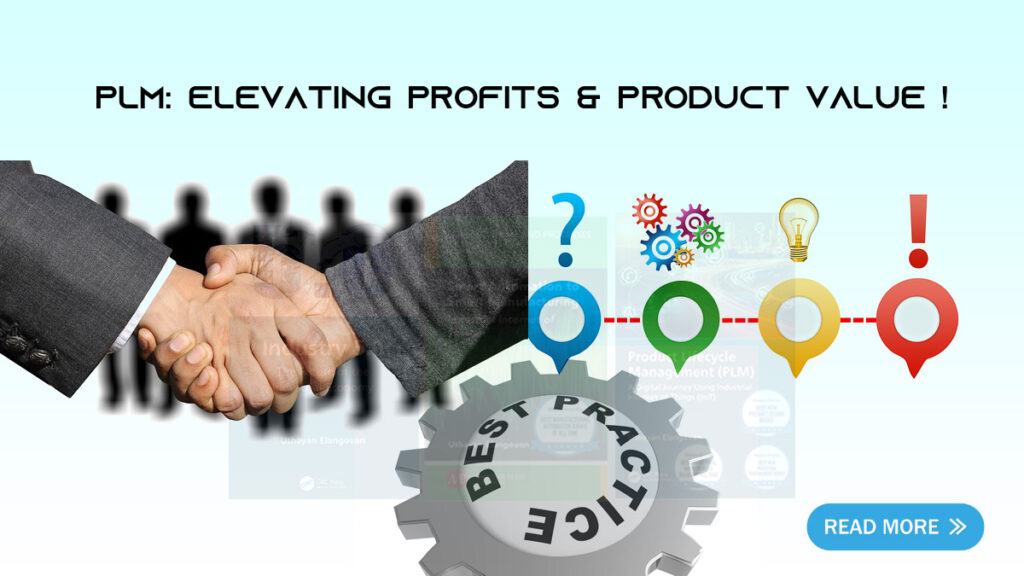Boosting Profits and Enhancing Product Value: Top PLM Best Practices for Manufacturing Enterprises
Introduction
As the global manufacturing landscape becomes increasingly competitive and complex, C-Level Executives of Manufacturing Enterprises worldwide are continually seeking innovative solutions to stay ahead of the curve. Product Lifecycle Management (PLM) has emerged as a powerful tool that not only streamlines internal processes but also plays a crucial role in maximizing profits and adding value to products for customers. In this article, we will explore the best practices of how PLM can help Manufacturing Enterprises achieve these critical objectives.

Centralized Product Data Management
One of the fundamental ways PLM helps in maximizing profits and adding product value is through centralized product data management. PLM software provides a unified platform to capture, store, and manage all product-related data throughout its lifecycle. This includes design specifications, engineering changes, supplier information, and customer feedback. By having a single source of truth, C-Level Executives can make well-informed decisions based on accurate and up-to-date information, reducing the risk of errors, delays, and costly rework.
Enhanced Collaboration and Communication
Effective collaboration and communication among various departments and stakeholders are vital for product success. PLM facilitates seamless collaboration by breaking down silos and enabling real-time sharing of information. Engineering teams can work closely with marketing, sales, and supply chain, ensuring that the product is aligned with customer needs and market demands. This cross-functional synergy ultimately leads to optimized product designs, reduced time-to-market, and increased customer satisfaction.
Efficient Resource Management
Resource optimization is crucial for maximizing profitability in manufacturing enterprises. PLM streamlines resource management by providing insights into resource utilization, capacity planning, and production scheduling. By optimizing resource allocation, manufacturers can reduce wastage, minimize production costs, and achieve higher profit margins without compromising on product quality.
Accelerated Innovation and New Product Development
Innovation is the lifeblood of any successful manufacturing enterprise. PLM accelerates innovation by providing a structured framework for new product development. It allows companies to efficiently manage ideas, concepts, and prototypes from inception to commercialization. With streamlined workflows and automated processes, PLM enables faster iterations, rapid prototyping, and quick market launches, giving companies a competitive edge in the industry.
Quality Control and Compliance
Ensuring product quality and compliance with industry regulations is non-negotiable for manufacturers. PLM plays a pivotal role in achieving these objectives by implementing robust quality control processes. It enables comprehensive testing, verification, and validation at each stage of the product lifecycle, ensuring that only high-quality products reach the market. Additionally, PLM solutions help in tracking and adhering to relevant industry standards and compliance requirements, avoiding costly penalties and reputation damage.
Personalization and Customer Experience
In the modern marketplace, customers demand personalized products that cater to their unique needs and preferences. PLM enables mass customization by allowing manufacturers to efficiently manage product configurations and variants. By leveraging customer data and market insights, manufacturers can create personalized offerings that enhance customer experience and foster brand loyalty, resulting in higher customer retention and repeat business.
After-Sales Support and Product Maintenance
The value of a product extends beyond its initial sale. Post-purchase support and product maintenance are crucial for building long-term customer relationships and driving profitability. PLM solutions enable manufacturers to monitor product performance, gather customer feedback, and proactively address issues through timely updates and improvements. Satisfied customers are more likely to become brand advocates, contributing to increased market penetration and revenue growth.
Conclusion
In conclusion, Product Lifecycle Management (PLM) is an indispensable tool for Manufacturing Enterprises seeking to maximize profits and add value to their products for customers. From centralized product data management to accelerated innovation, enhanced collaboration, and personalized customer experiences, PLM offers a holistic approach to optimizing the entire product lifecycle. Embracing these best practices can transform a manufacturing enterprise into an agile, customer-centric, and profitable organization.
If you’re a C-Level Executive in a Manufacturing Enterprise looking to unlock the full potential of PLM and drive substantial business growth, Neel SMARTEC is here to help. Our experienced team of experts can guide you through the PLM (OpenBOM, Windchill) implementation journey, tailoring solutions to fit your unique business needs. Connect with us today at [contact@neelsmartec.com] to explore how PLM can revolutionize your manufacturing processes and drive sustainable success.

